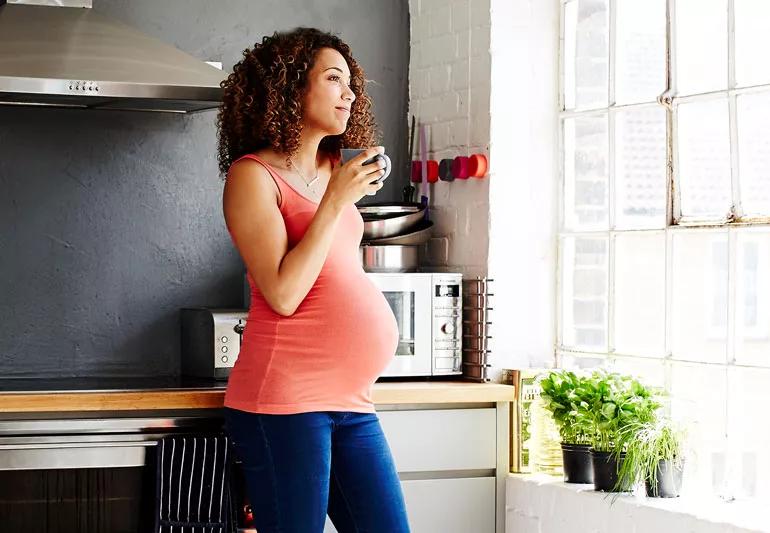Limit your caffeine intake to no more than 200 mg a day, including caffeinated foods

Image content: This image is available to view online.
View image online (https://assets.clevelandclinic.org/transform/c8b3d6e4-1a27-4e28-a9c4-852f9ef9f282/pregnantCoffee-563654663-770x553-1_jpg)
pregnant woman drinking coffee
Ah, nothing beats that first sip of coffee first thing in the morning. Pre-pregnancy, that first cup of coffee, tea or soft drink helped kickstart your day.
Advertisement
Cleveland Clinic is a non-profit academic medical center. Advertising on our site helps support our mission. We do not endorse non-Cleveland Clinic products or services. Policy
Now that you’re expecting, is it safe to drink caffeine or is it wise to hold off completely? Ob/Gyn Monica Svets, MD, talks about whether or not if it’s safe to drink caffeine while pregnant and how it can affect your baby.
Most people get their liquid caffeine fix with a soft drink, energy drink, tea or coffee. If you’re pregnant, the American Pregnancy Organization recommends you limit your caffeine intake to 200 mg a day and this includes food with caffeine, too.
But how do you know if you’re reaching your limit? Caffeine can be found in the following, and the amount can range from brand to how it’s prepared:
“Be sure to let your doctor know how much caffeine you drink or eat so they can help guide you toward the right caffeine intake level,” says Dr. Svets.
During pregnancy, it can take longer for your body to metabolize caffeine. This means that you might have caffeine in your bloodstream for a while after you drink coffee or other caffeinated beverages. You might hear this called “caffeine clearance,” which refers to how long it takes the caffeine to leave your bloodstream.
Advertisement
The placenta provides your fetus with food and oxygen through the umbilical cord. Because of this, when you drink coffee or other caffeinated beverages, the fetus will be on the receiving end of it. While there are studies that have conflicting evidence, it’s best to keep your caffeine intake to under 200 mg.
One study found that the amount of caffeine ingested while pregnant wouldn’t have an effect on the baby’s sleep during the first three months of their life.
Researchers at the University of Pelotas looked at the children of nearly 900 women who consumed caffeine in pregnancy. They found caffeine consumption during pregnancy did not affect their baby’s sleep during the first three months. They also looked at women who consumed both caffeine and breastfed and found similar results.
When it comes to breastfeeding, it’s possible your baby can feel the effects of caffeine. Another study reported that poor sleep patterns and fussiness was prevalent in babies whose mothers drank about 10 or more cups of coffee daily while breastfeeding. Those who drank more than 450 ml of coffee daily may have less iron in their breastmilk.
“One cup of average brewed coffee is about 137 milligrams of caffeine and the studies all looked at 200 milligrams as being the cutoff,” says Dr. Svets. “So, if you have just one cup of brewed coffee a day, you should be fine.”
The American College of Obstetricians and Gynecologists also maintains the recommendation that moderate caffeine consumption does not appear to be a major contributing factor in miscarriage or preterm birth.
If you’re unsure of how much caffeine is too much and have questions about your diet, talk to your doctor so you can both make the right decision for you and your baby.
Advertisement

Delivered every Tuesday!
Sign up for our Health Essentials emails for expert guidance on nutrition, fitness, sleep, skin care and more
It's a letter about the news!
Learn more about our editorial process.
Advertisement
Talk with them about their new sibling early and often
Dental care is not only safe during pregnancy, but it’s also highly recommended
A healthy pregnancy diet includes good amounts of folic acid, DHA, calcium and more
Always talk with your doctor for advice, too
Healthcare providers recommend waiting until week 13 to dye your hair, just to be safe
There’s only one proven way to stack the deck in favor of a boy or a girl
Having a baby after a loss can bring unexpected emotions
Your second-trimester is usually the best time to travel
Type 2 diabetes isn’t inevitable with these dietary changes
Applying a hot or cold compress can help with pain
Pump up your iron intake with foods like tuna, tofu and turkey